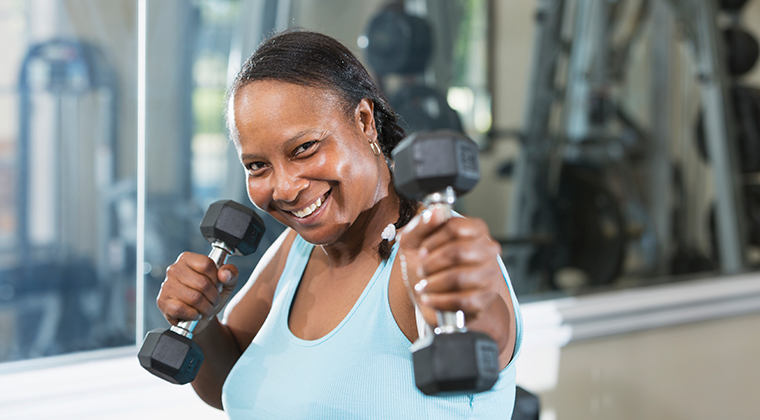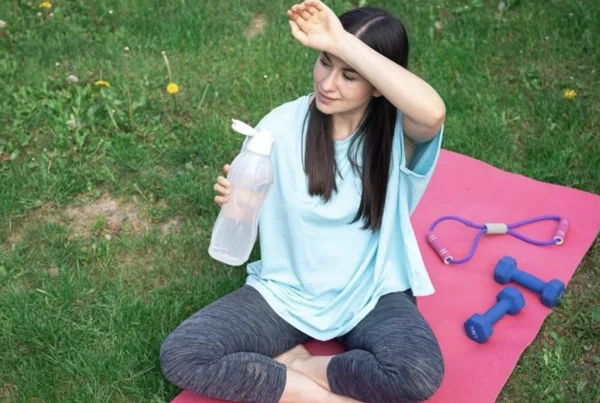Leading Physiotherapist Gives Five Inspiring Reasons Why Women Should Lift Heavy Weights
There are lots of misconceptions about women lifting heavy weights, Laura Harman, a leading physiotherapist at London’s Boost Physio says we shouldn’t be afraid of the heavy weights section in the gym.
Laura believes that weight training is essential to women’s physical and psychological well-being and that gaining physical strength positively impacts our emotional, physiological as well as physical health.
Here are Laura’s top reasons on why women should be lifting those big weights for that mind-body boost:
Psychological wellbeing – a natural high
Weight training is a fantastic way to improve your confidence and self-esteem. It can also help improve your mood and manage symptoms of stress and anxiety.
“We live in a society that places a great deal of emphasis on appearance and how women “should” look. We are lead to believe that fat loss and “looking great” are the most important factors associated with exercise and weight training, but what about feeling great? If your goal is to lose body fat, then you certainly will achieve that with weight lifting, but the benefits go way beyond that”, says Laura.
Lifting heavy weights and hitting personal bests that once seemed impossible can be extremely rewarding. Weight training allows you to fully appreciate what your body can do. That moment when you realise that you are stronger than you think is incredibly powerful. What’s more, that “superwoman feeling” isn’t just confined to the gym. That awkward pay rise meeting you need to have with your boss or that big presentation you need to do …piece of cake. You just smashed your PB.
Anti-ageing
It is a known fact that we lose skeletal muscle mass as we age. This is a condition known as Sarcopenia and it can have a huge impact on quality of life. If ignored, this decline in muscle tissue can lead to functional restrictions making everyday activities such as climbing stairs, dressing and getting out of a chair seem impossible.
We also know that bones tend to decrease density as we age, particularly after menopause, which can lead to conditions such as Osteoporosis. Our blood pressure can also creep up as we age, a study at the Appalachian State University found that weight training can be used to help lower blood pressure in addition to improving cardiovascular health.
Lose the Belly Fat – yes really
A University of Alabama study found that the women who lifted weights lost more intra-abdominal fat (deep belly fat) than those who just did cardio. Weight lifting will improve your posture, strengthen your core and help with balance, which is especially important in older women.
A study published in the American Journal of Preventative Medicine in 2003 found weight training to be effective in increasing muscle mass and strength in addition to improving bone density and the good news is that you are never too old to start training. So, set those targets and maximise your muscle mass with regular weight training.
Meet personal and career goals
Weight lifting requires discipline and focus. To get fit and strong you need to prioritise, plan and goal set on a weekly basis. The good news is that if you train regularly you’ll see results quite quickly. The skills used to discipline yourself in this way can then be transferred to all aspects of your life and help you to focus and achieve your goals outside of the gym.
Improved sleep quality
Getting a good night’s sleep seems to be the holy grail for some, rather that popping sleeping pills start lifting weights. Recent research by Appalachian State University weight training can help improve your sleep and can have the same effect as a warm bath before bed.
Don’t go it alone in the gym
The benefits of lifting heavy weights cannot be overstated, but coaching is extremely important and it is vital that you learn the correct techniques. I highly recommend seeing a strength and conditioning coach before embarking on a weight lifting programme to ensure safe an optimum technique. It may also be worth seeing a physiotherapist to have a full biomechanics assessment. This will address any abnormal movement patterns and areas of weakness that may prevent you from getting the most out of lifting.
As with any new activity, if you are new to weight lifting, it is important to start slowly with lighter weights and build up gradually as your strength improves. It is not advisable to lift heavy weights if you are pregnant or have recently undergone surgery. There are also other health complaints and injuries that are not suited to heavy lifting so always consult a health professional before starting to lift.
“Weight lifting has changed my mindset and general outlook on life. I’m generally pretty positive and ambitious, but I can struggle with confidence at times, and I’m extremely good at procrastinating. Lifting heavy weights has helped to improve my confidence in and out of the gym and learning the art of planning and goal settling has made me more focussed and driven in all aspects of my life”, says Laura.







